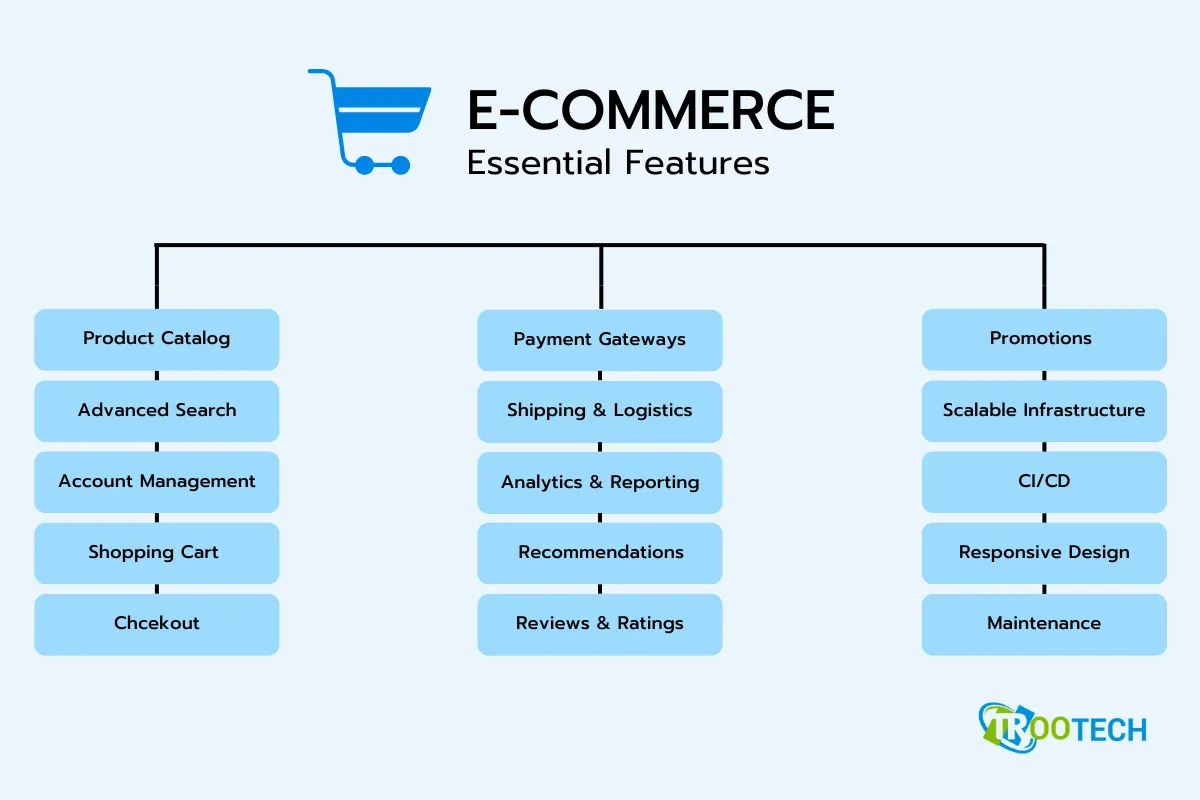Why is Django the Ultimate Framework for Large-Scale eCommerce Solutions?
Django is a popular, free, open-source Python-based web framework known for swift development and clean pragmatic designs. It is a preferred choice for creating complex and large-scale applications and data-driven websites.

Additionally, Django has become a worthy choice for crafting large-scale eCommerce platforms due to its high-end scalability and customization features. It also supports multiple currencies and payment gateways, implements robust security measures, and can efficiently handle sudden increases in online traffic growth.
Most of us have read and are familiar with the success stories of eCommerce giants like Amazon, eBay, or Walmart.
We know how Jeff Bezos launched Amazon in 1994 as an online bookstore, which evolved and transformed into one of the most successful and top-notch eCommerce companies worldwide.
We often celebrate the prominent front-end players behind Amazon's phenomenal success, but have you ever thought about the backstage heroes? These unsung champions are the ones who make Amazon highly navigable, user-intuitive, and scalable.
Backend web development frameworks like Django are those unsung heroes.
We have witnessed emphatic and colossal growth in the eCommerce industry. According to Statista, it is estimated to increase to $6,478 billion by 2029 from its current value of $4,117 billion in 2024.
Such a whopping boost in demand requires an advanced, highly scalable, efficient, and agile technological solution. This includes a robust front-end and back-end framework.
The digital transformation of businesses and consumer shopping habits is driving and leading to the significant growth of the eCommerce industry. This rapid expansion paves the way for advanced software solutions that can handle high traffic, secure transactions, and seamless user experiences to stay competitive.
Importance of Choosing the Right Technology to Create Scalable, Secure, and Feature-Rich eCommerce Platforms
It is paramount to choose the right technology for eCommerce platform development that ensures scalability, security, and enhancing user-centric features.
How Does it Benefit Your Online Store?
- If your eCommerce platform is scalable, it can quickly and efficiently manage high traffic and data loads as the business grows, preventing website crashes and slowdowns. Scalability also accommodates future expansion plans, providing a seamless shopping experience to customers.
- Security is equally critical in eCommerce, where handling sensitive customer data and financial transactions is routine. The chosen technology must provide robust security features to protect against cyber threats, ensuring customer trust and regulatory compliance.
- Feature-rich platforms are necessary to meet diverse customer expectations and provide a competitive edge. Advanced features such as personalized recommendations, real-time inventory updates, and smooth checkout processes enhance user experience and drive sales.
An Introduction to Django
Django is one of the best Python web frameworks, known for its streamlined development process, elegant design philosophy, and versatile functionalities that make it a cornerstone in eCommerce development.
Django is a reliable and powerful web framework for eCommerce development, enabling developers to craft sophisticated platforms with greater flexibility and efficiency. Its MVC (Model-View-Controller) architecture fosters modular development, allowing teams to collaborate seamlessly and iterate rapidly.
Our expert Django developers shared their experiences working with the Django framework saying that its built-in tools for caching, database optimization, and asynchronous processing empower eCommerce businesses to effortlessly scale their platforms to meet growing demands without sacrificing performance or reliability.
Django’s Revelence in eCommerce Development
- Django offers a versatile toolkit that simplifies the development process, allowing developers to build complex eCommerce platforms with relative ease.
- Its scalability allows eCommerce businesses to build diverse features and libraries, including user authentication, content management, and session handling.
- The web framework provides robust and fortified security to safeguard eCommerce platforms from common vulnerabilities like SQL injection and cross-site scripting (XSS) attacks.
- It boasts a vibrant and active community of developers who continuously contribute to its improvement, providing a wealth of resources, tutorials, and plugins for eCommerce development.
We shall discuss all these relevant points in detail.
Why Choose Django for Large-Scale eCommerce Platforms?

1. Django is Scalable
So far, we have discussed and mentioned that Django is mainly chosen for building large-scale eCommerce platforms due to its enhanced scalability, due to which it can seamlessly handle high traffic and large volumes of data.
But how does Django achieve this? Let’s find out.
High Traffic Management
- Django provides a modular architecture that enables efficient load balancing, distributed computing, and caching mechanisms.
- It integrates with powerful databases, such as PostgreSQL that can quickly handle millions of queries per second.
Managing Large Data Volumes
- Django ORM (Object-Related Mapping) simplifies complex database queries, making it easy to manage large datasets.
- It also supports horizontal scaling by deploying multiple instances across servers.
Handling of Asynchronous Task
- Integration with Celery for background task processing ensures smooth operations without blocking main processes
A Few Top-Notch Brands and Renowned Companies Using Django Framework
- YouTube - The Online Video Sharing Platform uses Django to manage and process high volumes of data and user interactions for smooth video uploads and background operations.
- Instagram - The social media platform utilizes Django to manage its backend and handle millions of users and extensive databases through a scalable architecture.
- Google - The search engine giant uses Django in various internal tools and operations. The web framework also provides a reliable and fast development framework for creating and deploying new features quickly.
- Spotify - Django manages some of its web-based features and services, including user data, recommendations, and other dynamic content efficiently.
- Pinterest - The most popular image-sharing and social media service company used Django for its early infrastructure which helped it speed up prototyping and scaling user base and data requirements.
In addition to these, there are various other companies like NASA, Washington Post, and Eventbrite using Django for various purposes. You can also hire Django developers from us to make your eCommerce store more scalable and secure. Django is renowned for its strong security features, making it an ideal choice for handling large user bases and transactions, especially in eCommerce and high-traffic platforms. Here’s how Django ensures top-notch security:
2. The Built-in Security Features in Django
Django’s comprehensive security features provide a strong defense against common web vulnerabilities, ensuring the safety and integrity of large-scale applications. This reliability is crucial for platforms handling extensive user interactions and transactions, ultimately fostering user confidence and business continuity.
- Cross-Site Scripting (XSS) Protection: Django automatically escapes special characters in templates, preventing XSS attacks.
- Cross-Site Request Forgery (CSRF) Protection: Built-in middleware and CSRF tokens prevent malicious sites from making unauthorized requests on behalf of users.
- SQL Injection Protection: The Django ORM protects against SQL injection by using parameterized queries.
Clickjacking Protection: Django provides middleware to set X-Frame-Options headers, preventing clickjacking attacks. - Secure Password Storage: Passwords are stored using PBKDF2, a secure hashing algorithm, with the option to use other algorithms like Argon2 and bcrypt.
- SSL/HTTPS: Django easily integrates with SSL to ensure encrypted data transmission.
The Significance of Security
In managing large user bases and transactions, security becomes paramount for several reasons:
- User Trust: Ensuring robust security measures builds trust among users, critical for retaining customers in eCommerce and social media platforms.
- Data Protection: Protecting sensitive user data, such as personal information and payment details, is crucial to prevent data breaches and financial loss.
- Compliance: Adhering to security standards and regulations (like GDPR, and HIPAA) is mandatory for legal compliance and avoiding hefty fines.
- Reputation Management: A single security breach can tarnish a company’s reputation. Robust security measures help maintain a positive public image.
3. The Benefits of Django’s Rapid Development
Django's rapid eCommerce software development capabilities empower developers to build robust, scalable, and secure eCommerce platforms efficiently. By leveraging Django's modular architecture, flexibility, and extensive ecosystem, businesses can accelerate the development process, reduce time-to-market, and deliver exceptional online shopping experiences.
- Reusable Components: Django's modular structure allows developers to reuse pre-built components and libraries, reducing development time significantly.
- Built-in Admin Interface: Django provides an admin interface out of the box, enabling quick setup and management of eCommerce functionalities without building them from scratch.
- ORM (Object-Relational Mapping): Django's ORM simplifies database operations, speeding up the development process by eliminating the need for writing complex SQL queries.
- Modular Architecture: Django's modular design allows for easy customization and extension, enabling developers to tailor eCommerce solutions to specific business requirements.
- Template System: Django's template system provides flexibility in designing frontend layouts and user interfaces, allowing for custom designs and branding.
- Third-party Packages: Django has a vast ecosystem of third-party packages that can be easily integrated to add additional features and functionalities, reducing development time for custom requirements.
- Scalable Infrastructure: Django's scalability ensures that eCommerce platforms can handle growth in traffic and transactions over time without compromising performance.
- Efficient Codebase: Django's clean and organized codebase makes it easier to scale applications by adding new features or optimizing existing ones without introducing complexity.
- Built-in Security Features: Django comes with built-in security features such as protection against common web vulnerabilities like CSRF, XSS, and SQL injection, ensuring that eCommerce platforms are secure by default.
- Regular Updates: Django's active development community ensures that security patches and updates are released regularly, reducing the risk of security vulnerabilities.
- API Integration: Django's REST framework facilitates seamless integration with third-party services, payment gateways, and external APIs, allowing eCommerce platforms to connect with various systems and tools.
- External Libraries: Django supports integration with popular external libraries and frameworks, making it easier to incorporate advanced features such as payment processing, shipping, and analytics.
Uncover the Potential of Django for Building Scalable eCommerce Solutions
Unleash the Benefits of its High-End Scalability and Security
Essential Features of Large-Scale eCommerce Stores

Product Catalog and Inventory Management
A crucial aspect of any successful eCommerce platform is the ability to create and manage extensive product catalogs dynamically.
- Django allows businesses to showcase a wide variety of products, catering to diverse customer needs.
- It offers a robust product catalog system that enables the addition, modification, and deletion of products with ease.
- It provides real-time inventory tracking, ensuring that the availability of products is always up-to-date, preventing scenarios where customers attempt to purchase out-of-stock items.
- Bulk product management capabilities allow businesses to efficiently handle large quantities of products, simplifying the process of updating prices, descriptions, and stock levels.
Advanced Search and Filtering
Implementing advanced search functionalities significantly enhances the user experience.
- Django provides powerful search capabilities within the eCommerce platform allowing customers to quickly find products by typing keywords, product names, or categories.
- It incorporates filters and sorting options to refine the search process, enabling users to narrow down their choices based on various attributes like price, brand, color, size, and more.
- This feature not only improves the shopping experience but also increases the likelihood of conversions.
User Account Management
Robust user account management is essential for building a loyal customer base. This includes secure user authentication processes to ensure that user data remains protected.
- When using the Python Django framework, users can access personalized features such as wishlists, order history, and preferences.
- The web framework helps to create a tailored shopping experience, encouraging repeat visits and purchases.
- Profile management capabilities also allow users to update their personal information and preferences, ensuring their shopping experience remains relevant and personalized.
Shopping Cart and Checkout Process
Designing a user-friendly shopping cart is fundamental for retaining potential customers.
- Hire Python developers with expertise in the Django framework to create a user-intuitive, seamless, and secure shopping cart allowing users to add, remove, and modify items easily.
- It displays all necessary information, including product images, names, prices, and total cost.
- It provides a smooth and safe checkout process, guiding users through steps like entering shipping details, selecting payment methods, and reviewing the order.
- Django is known for adopting high-end security, such as encryption and compliance with payment standards to protect sensitive information.
Responsive Design
In today’s mobile-centric world, having a mobile-friendly design is no longer optional.
- The best Django eCommerce frameworks ensure the platform provides an optimal viewing experience across all devices, including desktops, tablets, and smartphones.
- Techniques for building responsive eCommerce sites with Django involve using flexible grid layouts, media queries, and responsive images.
- It ensures the site is easy to navigate and visually appealing on smaller screens to enhance the user experience, leading to higher engagement and conversion rates.
Performance Optimization
Optimizing load times and site performance is critical for maintaining user satisfaction.
- The Django app allows you to implement various strategies to enhance eCommerce platform performance, such as caching where you can store frequently accessed data to reduce server load and improve response times.
- It also offers effective load-balancing, distributing the incoming traffic across multiple servers, preventing any single server from becoming overwhelmed.
- Django focuses on offering smooth performance during high-traffic periods and enhancing website reliability.
- Database optimization techniques, such as indexing, query optimization, and using efficient data structures, can also significantly improve site performance.
- Additionally, minimizing the use of large images and leveraging content delivery networks (CDNs) can further reduce load times.
Integration with Payment Gateways
- Python Django frameworks ensure the integration of popular payment gateways such as PayPal, Stripe, and others is crucial for providing customers with secure and diverse payment options.
- These gateways ensure that transactions are processed swiftly and securely, which builds customer trust and improves the overall shopping experience.
- By using established payment gateways, eCommerce platforms can leverage their built-in fraud detection and encryption measures, thereby safeguarding sensitive financial data.
Shipping and Logistics
- Django framework connects your eCommerce platform with shipping APIs for real-time shipping rates and tracking is essential for efficient logistics management.
- The integration with shipping providers allows your eCommerce platform to offer customers accurate shipping costs and delivery times during checkout.
- You also get the benefit of real-time tracking to monitor their orders, enhancing transparency and trust.
- Logistics software management ensures timely deliveries and helps in managing inventory more effectively.
Analytics and Reporting
- eCommerce websites using Django can implement tools to track and analyze the platform performance for informed decision-making.
- Django integrates with analytics tools or custom dashboards to provide insights into customer behavior, sales trends, and site performance.
- This data-driven approach enables businesses to identify areas for improvement, optimize marketing strategies, and enhance user experience.
- Regular reporting ensures stakeholders stay informed about key metrics and can make strategic adjustments promptly.
Personalized Recommendations
- Django helps implement recommendation engines using machine learning can significantly enhance user engagement and sales.
- These systems analyze customer behavior and preferences to suggest products that align with their interests.
- Personalized recommendations not only improve the shopping experience but also increase the likelihood of cross-selling and upselling, thereby boosting revenue.
Reviews and Ratings
- Now, you can build a robust system for customer reviews and ratings, essential for product credibility and customer trust.
- Reviews provide potential buyers with insights into product quality and performance, influencing their purchasing decisions.
- A well-designed review system should allow customers to easily leave feedback, rate products, and read other users’ experiences.
Promotions and Discounts
- You will be happier to note that with Django Python you can manage promotional campaigns, discounts, and loyalty programs effectively enhance customer retention, and drive sales. This is why Instagram uses Django.
- It offers features like coupon codes, flash sales, and rewards programs to incentivize repeat purchases and attract new customers.
- An advanced eCommerce platform should provide flexible tools to create, monitor, and analyze the success of these campaigns, ensuring that they meet business objectives.
Scalable Infrastructure
- We have already discussed and highlighted several times that Django is known for its amplified scalability. It can align with cloud service providers like AWS or Azure to ensure the eCommerce platform scales seamlessly.
- AWS, Azure, and GCP can also handle the fluctuating traffic loads without compromising performance.
- Containerization technologies such as Docker and Kubernetes enable efficient resource management and quick deployment of applications, ensuring the platform remains robust and scalable as the user base grows.
Continuous Integration and Deployment (CI/CD)
- Setting up CI/CD pipelines becomes easier and quicker for continuous updates and improvements with the Django framework.
- It automates the testing and deployment process, reducing the risk of errors and ensuring that new features and fixes are rolled out smoothly.
- This approach maintains site stability and performance, as any issues can be identified and addressed promptly through automated testing before changes go live.
Monitoring and Maintenance
- Django web framework allows you to utilize tools and practices for site performance and security, evaluating proactive maintenance.
- You can use monitoring tools and custom monitoring scripts to track site performance, and uptime, and check real-time security vulnerabilities. This includes patch management and performance tuning, ensuring a faster, secure, and reliable eCommerce platform.
- Scheduled maintenance windows and transparent communication about downtime also help maintain trust and minimize disruptions.
Plan to Implement and Use Django For eCommerce Development?
Learn About its Benefits for Large-Scale eCommerce Projects
Future Trends and Innovations in eCommerce

The vast arena of eCommerce development is evolving rapidly where transformative and emerging technologies like AI, AR/VR, and voice commerce are bringing a paradigm shift in how we shop online. These innovations are enhancing personalization, creating immersive experiences, and making shopping more convenient.
Integrating these technologies with Django can propel e-commerce platforms into the future, offering unparalleled user experiences.
Artificial Intelligence is Revolutionizing Customer Experience and Enhancing Personalization
Did you know that -
According to a report, 84% of eCommerce businesses keep AI as their utmost priority and AI helps to enhance customer satisfaction and reduce operational costs by 25%. The same report indicates that AI in the eCommerce market is expected to reach $45.72 billion by 2032.
Artificial Intelligence (AI) is revolutionizing e-commerce by enhancing personalization and improving customer service. AI-driven recommendation engines analyze user behavior to suggest products, increasing sales and customer satisfaction.
Chatbots powered by AI provide instant customer support, handling inquiries efficiently and effectively. For instance, AI chatbots integrated into Django applications can enhance user interaction, offering tailored shopping experiences and solving common customer issues quickly.
AR and VR Transform Customer Shopping Experience
Currently, 32% of US customers are using augmented reality technology for shopping on eCommerce platforms, which will certainly increase in the upcoming years. Also, AR technology can generate 200% more customer engagement.
Augmented Reality (AR) and Virtual Reality (VR) are transforming the way consumers shop online. AR enables customers to visualize products in their environment before making a purchase, significantly reducing return rates and increasing buyer confidence.
For example, furniture retailers like IKEA use AR to let customers see how a couch would look in their living room. VR takes this a step further by offering immersive shopping experiences, allowing users to explore virtual stores and interact with products in a simulated environment.
Django can leverage AR/VR by integrating third-party APIs and creating interactive product views and virtual showrooms within e-commerce platforms.
Voice eCommerce Makes Product Search a Cakewalk
Voice commerce is gaining traction as more consumers use smart speakers and voice assistants like Amazon Alexa and Google Assistant for shopping. Voice-activated commands streamline the purchasing process, making it convenient for users to order products hands-free while performing other tasks.
Django can support voice commerce by integrating with voice recognition APIs, enabling features such as voice search, voice-activated product recommendations, and voice-activated checkout. This integration can provide a seamless and hands-free shopping experience, making it easier for users to shop on the go.
Empower Your eCommerce Platform with Django for Maximum Efficiency
Streamline Your Online Business with Django
Django’s Integration With These Technologies
Django's versatility and robust framework make it well-suited for incorporating these advanced technologies. Its comprehensive ecosystem and numerous libraries and packages allow developers to efficiently integrate AI, AR/VR, and voice commerce capabilities.
For instance, Django's REST framework can be used to build APIs that interact with machine learning models for AI-driven features. Similarly, AR and VR integrations can be achieved using JavaScript libraries alongside Django's backend, providing a cohesive user experience.
By integrating AI, AR/VR, and voice commerce, Django-powered e-commerce platforms can stay ahead of the curve, offering innovative and engaging shopping experiences.
These technologies not only enhance functionality but also provide a competitive edge in the rapidly evolving e-commerce landscape. As consumer expectations continue to rise, leveraging these emerging technologies will be crucial for businesses looking to attract and retain customers in the digital marketplace.
The Final Answer- Is Django the Best Choice for Large-Scale eCommerce Development
The Final Answer is YES. Django is an ideal and viable choice for developing large-scale eCommerce platforms because it offers unparalleled scalability, robust security, and supports rapid development. If we compare Flask Vs Django, we find that the latter framework provides an extensive library ecosystem and flexibility, including integration with next-generation technologies, like, AI, AR/VR, and voice commerce, enhancing both functionality and user experience.
Businesses should consider Django for their next e-commerce project due to its reliability and ease of integration with emerging technologies. Its strong community support and comprehensive documentation further simplify development, ensuring a smooth and efficient process.
Please get in touch with our expert Django consultants and developers to share your unique eCommerce business idea if you want to create a platform similar to Amazon or eBay. Get a user-friendly, interactive, and seamlessly navigable storefront that helps you stay competitive and meet evolving consumer expectations.
FAQs
Django is a high-level Python web framework that promotes rapid development and clean, pragmatic design. It's excellent for e-commerce websites due to its scalability, security, and rich feature set. While not necessarily the best for every use case, Django's latest version offers comprehensive tools like ORM, an admin interface, and robust security features.
Yes, Django is well-suited for e-commerce websites due to its robust features tailored for scalability and security. Its built-in functionalities like ORM (Object-Relational Mapping), user authentication, and session management simplify development. Additionally, Django's templating system allows for flexible and dynamic web page rendering, ideal for e-commerce platforms' diverse content requirements.
While Django is widely regarded as one of the top web frameworks, determining the "best" framework depends on project specifics. Django excels in providing a comprehensive set of tools for rapid development, security, and scalability. However, other frameworks may better suit certain projects based on factors like language preference, project size, or specific feature requirements.
Django offers an extensive array of features, including its ORM for database management, a robust admin interface for site administration, built-in user authentication and authorization mechanisms for security, and a powerful template engine for dynamic content rendering. Additionally, Django provides tools for URL routing, form handling, and internationalization, making it a versatile and comprehensive framework.
Currently, Django 5.0.6 stands as the latest stable release. Each new version of Django typically introduces enhancements, bug fixes, and new features, ensuring that developers have access to the latest tools and improvements for building web applications. Keeping up-to-date with the latest version ensures compatibility with the latest Python releases and access to the most recent features and security updates.

